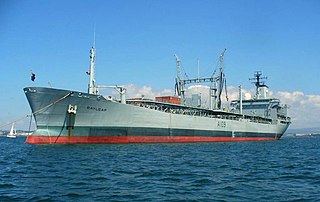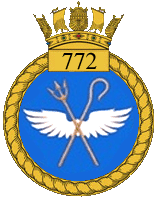
The Royal Fleet Auxiliary (RFA) is a naval auxiliary fleet owned by the UK's Ministry of Defence. It is a component of His Majesty's Naval Service and provides logistical and operational support to the Royal Navy and Royal Marines. The RFA ensures the Royal Navy is supplied and supported by providing fuel and stores through replenishment at sea, transporting Royal Marines and British Army personnel, providing medical care and transporting equipment and essentials around the world. In addition the RFA acts independently providing humanitarian aid, counter piracy and counter narcotic patrols together with assisting the Royal Navy in preventing conflict and securing international trade. They are a uniformed civilian branch of the Royal Navy staffed by British merchant sailors. The RFA is one of five RN fighting arms.
This is a list of the naval forces from the United Kingdom that took part in the Falklands War, often referred to as "the Task Force" in the context of the war. For a list of naval forces from Argentina, see Argentine naval forces in the Falklands War.

RFA Orangeleaf was a Leaf-class fleet support tanker of the Royal Fleet Auxiliary (RFA), the naval auxiliary fleet of the United Kingdom, and which served with the fleet for over 30 years, tasked with providing fuel, food, fresh water, ammunition and other supplies to Royal Navy and allied naval vessels around the world.

RFA Diligence was a forward repair ship of the Royal Fleet Auxiliary. Launched in 1981 as a support ship for North Sea oil rigs, she was chartered by the British government to support naval activities during the 1982 Falklands War and was later bought outright as a fleet maintenance vessel. She gave assistance to the damaged USS Tripoli and Princeton in the 1991 Gulf War, and to Sri Lanka after the 2005 tsunami. She typically had deployments of 5-8 years in support of the Trafalgar-class submarine on duty east of Suez, with a secondary role as a mothership for British and US minesweepers in the Persian Gulf. Until 2016 Diligence was set to go out of service in 2020. However in August 2016, the UK Ministry of Defence placed an advert for the sale of RFA Diligence. As of 2016 the option for the delivery of future operational maintenance and repair capability for the RFA remained under consideration. However, the 2021 British defence white paper made no specific mention of the need for this capability. In April 2024 she arrived in Turkey for recycling.

RFA Fort Austin is a retired British Fort Rosalie-class dry stores ship of the Royal Fleet Auxiliary.

RFA Fort George was a combined fleet stores ship and tanker of the Royal Fleet Auxiliary, and one of two Fort Victoria-class replenishment oilers.

RFA Bayleaf (A109) was a Leaf-class support tanker of the Royal Fleet Auxiliary (RFA), the naval auxiliary fleet of the United Kingdom, which served with the fleet for 30 years, tasked with providing fuel, food, fresh water, ammunition and other supplies to Royal Navy vessels around the world.

RFA Fort Rosalie was the lead ship of her class of Royal Fleet Auxiliary fleet replenishment ships. Fort Rosalie was originally named RFA Fort Grange, but was renamed in May 2000 to avoid confusion with the now-decommissioned RFA Fort George. On 31 March 2021, the ship was withdrawn from service.

RFA Oakleaf (A111) was a Leaf-class fleet support tanker of the Royal Fleet Auxiliary (RFA), the naval auxiliary fleet of the United Kingdom. Formerly the Swedish vessel MV Oktania, built by A. B. Uddevalla, Sweden, and completed in 1981, Oakleaf was added to the Royal Fleet Auxiliary in 1986, before being decommissioned in 2007.

NRP Bérrio (A5210) was a fleet support tanker of the Portuguese Navy. She was built by Swan Hunter in 1969 at Hebburn, England as RFA Blue Rover (A270) of the Rover-class and from 1970 to 1993 was part of the British Royal Fleet Auxiliary. In 1982 during her British service she participated in the Falklands War.

HMS Argonaut (F56) was a Leander-class frigate that served with the Royal Navy from 1967 to 1993. She took part in the Falklands War in 1982, sustaining damage and casualties in action.

The Wave-class tankers are a class of fast fleet tankers in service with the Royal Fleet Auxiliary. The class is tasked with providing fuel, food, fresh water, ammunition and other supplies to Royal Navy vessels around the world. There are two ships in the class, RFA Wave Knight and RFA Wave Ruler. The ships were ordered to replace the aging Ol-class tankers RFA Olna and RFA Olwen. The two vessels have seen service in a number of locations, including anti-drug and hurricane relief operations in the Caribbean Sea, anti-piracy activities around the Horn of Africa, and deterrent patrols in the South Atlantic. As of early 2022, both ships were earmarked for "extended readiness" status.

His Majesty's Naval Service is the United Kingdom's naval warfare and maritime service. It consists of the Royal Navy, Royal Marines, Royal Fleet Auxiliary, Royal Naval Reserve, Royal Marines Reserve and Naval Careers Service. The Naval Service as a whole falls under the command of the Navy Board, which is headed by the First Sea Lord. This position is currently held by Admiral Sir Ben Key. The Defence Council delegates administration of the Naval Service to the Admiralty Board, chaired by the Secretary of State for Defence.
These are some of the key weapons of the Falklands War used by both sides.

The Fort Rosalie or Fort class of fleet replenishment vessel of the British Royal Fleet Auxiliary were designed to replenish Royal Navy taskgroups with various armaments and victualling stores while under way. Unlike the bigger Fort Victoria class, they supply dry stores and not fuel. RFA Fort Rosalie was originally known as Fort Grange but was renamed in 2000 to avoid confusion with the new Fort Victoria-class replenishment oiler RFA Fort George. Both ships were withdrawn from service and later sold in 2021.

RFA Wave Ruler is a Wave-class fast fleet tanker of the Royal Fleet Auxiliary (RFA) of the United Kingdom tasked with providing fuel, food, fresh water, ammunition and other supplies to Royal Navy vessels around the world.

RFA Wave Knight is a Wave-class fast fleet tanker of the Royal Fleet Auxiliary (RFA) of the United Kingdom tasked with providing fuel, food, fresh water, ammunition and other supplies to Royal Navy vessels around the world.

772 Naval Air Squadron was a Naval Air Squadron of the Royal Navy's Fleet Air Arm which last disbanded during September 1995. 772 Naval Air Squadron formed as a Fleet Requirements Unit out of ‘Y’ Flight from 771 Naval Air Squadron at RNAS Lee-on-Solent in September 1939. While the headquarters remained there, floatplanes were operated out of RNAS Portland, however, mid 1940 saw the whole squadron move north to RNAS Campbeltown and roughly twelve months afterwards the short distance to RNAS Machrihanish. The unit moved to RNAS Ayr in July 1944 and became the Fleet Requirements Unit School. In January 1946 the squadron moved to RNAS Burscough in Lancashire, before moving to RNAS Anthorn in Cumberland, in May. It became the Northern Fleet Requirements Unit upon moving to RNAS Arbroath, in June 1947, but disbanded into 771 Naval Air Squadron in October. 772 Naval Air Squadron reformed as a Helicopter Support Squadron at RNAS Portland in September 1974. In September 1977 the squadron took over responsibility for a number of Ships' Flights of Royal Fleet Auxiliary ships. The squadron was used to reform 848 Naval Air Squadron for the Falklands Task Force in 1982, with the Ships' Flights absorbed into 847 Naval Air Squadron. In August 1982 it took on the Anti-Submarine Warfare Flight from 737 Naval Air Squadron and between 1983 - 1985 a Search and Rescue Flight operated out of RNAS Lee-on-Solent.
In 1989 the Royal Navy was under the direction of the Navy Department in the UK Ministry of Defence. It had two main commands, CINCFLEET and Naval Home Command.

Exercise Spring Train was an annual Royal Navy-led NATO maritime exercise conducted in the Eastern Atlantic. It is most notable for the 1982 exercise which involved seven warships that were subsequently sent to the South Atlantic after the Argentine invasion of the Falkland Islands. Because the vessels involved already had full crews and were able to crossdeck supplies from other ships in the exercise the British response was more rapid than would have otherwise been possible. Two of the vessels involved in the exercise, the Type 42 destroyers Sheffield and Coventry, were sunk during the war. There has been speculation that some of the ships sent to the Falklands from Exercise Spring Train were carrying tactical nuclear weapons, which were routinely carried when on NATO deployments. The 1983 edition of the exercise was criticised by the Spanish and Soviet government who considered it provocative.


















